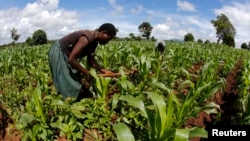Taking out insurance to protect against climate risks is the "wrong model" for improving countries' ability to cope and may even be worsening inequality and vulnerability, a leading development charity said on Wednesday.
A policy taken out by Malawi cost the drought-ridden southern African country $5 million but failed to deliver timely assistance to more than 6.5 million people affected in 2016 and shows that insurance is "poor value for money", ActionAid said.
Insurance is viewed by some as a solution for developing countries to cushion farmers against extreme weather that can worsen poverty and threatens to roll back development gains.
ActionAid said in a report there had been major defects in the model, data and process used by insurers African Risk Capacity Insurance Company Limited (ARC Ltd.) to determine a payout to Malawi.
"Insurance is not a quick fix for broken development, adaptation and humanitarian finance systems," Jonathan Reeves, the report's author, said in a statement.
ARC Ltd. did not automatically trigger a payout on the policy, citing "the model indicated a low number of people affected by drought," the insurer said in an email to the Thomson Reuters Foundation.
ARC Ltd. rejected the findings in the report and said it had worked closely with technical experts in Malawi to customize the insurance model.
Malawi took out insurance based on a crop - long-cycle maize - that, as it turned out, most farmers did not grow in the 2015/2016 season. Long-cycle maize survived the drought, while the short-cycle maize most farmers grew did not.
After investigating the discrepancy, ARC Ltd. made a payment of $8.1 million to Malawi in January 2017, which ActionAid deemed "too little, too late".
The total cost of responding to the drought cost Malawi, where more than 80 percent of the population are smallholder farmers, an estimated $395 million, according to the report.
No quick fix
Last year, southern African states appealed for $2.9 billion in aid when the region was hit with its worst drought in 35 years, affecting 39 million people. Now, drought in the continent's east is pushing millions into hunger.
Insurance can be triggered more quickly than international aid, which can take months to fund.
ARC Ltd.’s cover is based on a pre-agreed plan for how the government will use the payout.
The index-based insurance offers maximum coverage of $30 million per country per season for drought events that occur with a frequency of one in five years or less.
Twenty-five percent of land-locked Malawi has experienced drought more than seven times in the last decade, according to the United Nations' World Food Programme.
As of November 2016 around 6.7 million people, about a third of the population, were in need of urgent food or cash support.
Recent droughts have been exacerbated by the El Niño weather phenomenon and an infestation of armyworms, an invasive Latin American pest that has decimated maize fields, a staple crop in the country.








